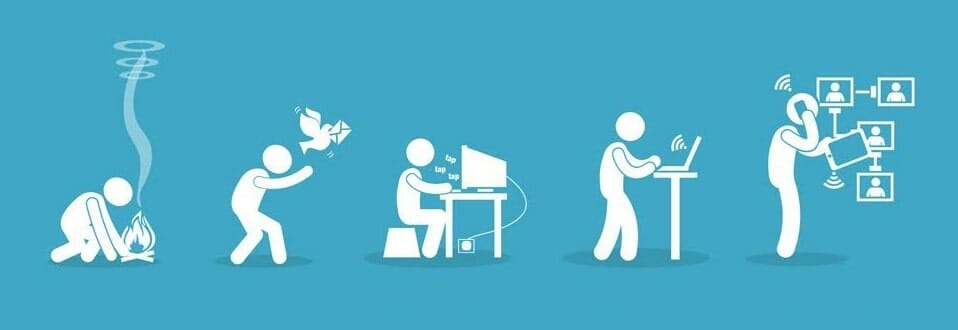Communication is indeed key, especially in the working world. Some of you may not know this, but it plays a huge role in creating a good impression with your clients or employers.
Employers want someone who can easily engage with clients or team members – it gets things done more effectively.
Some factors which determine your communication skills are speed of response, articulation, eye contact (for face-to-face meetings), and of course, substance.
Read on to learn how to be a better communicator!

Source: https://inspireone. In/wp-content/uploads/2018/08/evolution-of-communication. Jpg
Speed of Response
How quickly or how prompt your responses are, is important in the working world. Bear in mind that some things just can’t wait – your clients could be waiting for your reply on the progress of a project, or your manager could be waiting on an important report.
Promptly responding to them allows them to resolve this task and move on to the next. On a larger scale, your speedy response ensures overall company efficiency.
Quick communication becomes even more important when something goes wrong. If you encounter a problem, don’t lah keep it to yourself, only for everyone to find out at the eleventh hour. It can cost your company the entire project because it affects your quality of work and delivery time.
When you communicate quickly, you give the other party the impression that you treat the matter with urgency. We all know that there are other things to do as well, but prioritizing tasks is a skill that needs to be mastered.
Substance
Next would be substance. Whatever you do, don’t blurt out the first thing that comes to mind. Stating the obvious in important discussions is a waste of everybody’s time – and nobody appreciates that.
It’s not necessary to give opinions on every question asked or every issue raised. Speak what you know and know what you speak.
Speak on issues that you have a clear idea about or are familiar with. This will give people valuable information which can help resolve the problem. It also lets them know that you are the go-to person on the subject.

Source: https://www. Linkedin. Com/media-proxy/ext? W=1200&h=675&hash=hmvezb95sgcbi4r0dj5lezn9z5c%3d&ora=1%2cafbctxdkrmpgl2lvqufbpq%2cxavta5g-0r6plxvuzguv5k_prkc9q0riujdpby-gxcwt_d2fyxdpfsdxzlsiolqvcsobkqeweuegqzlmey69lclmy4yx3a
Being Articulate
Being articulate means to be able to effectively communicate your message. Sometimes, this can be hard, especially when you know that the person on the other end won’t like what you have to say.
So how do you speak articulately and with tact? Same advice from the previous point – don’t jump the gun when you speak. Think rationally and not emotionally.
If a client upsets you, don’t just email your client to f*** off. Put it into a proper explanation and communicate professionally. That’s tact.
Sometimes, people just don’t know that the way they act can be off-putting to others. By communicating your expectations politely, it can improve the working relationship and give people the chance to change.
Being articulate makes you appear professional, well-adjusted, and composed. Refute politely with substance and not with emotions.

Body Language
If you’re meeting someone face to face in a professional setting, body language plays a big part (especially when it comes to clients). Keep it casual but also professional.
Don’t laugh at anything unless it’s a joke. You don’t want your client to think you’re fooling around.
Plus, don’t fidget! Stay calm and don’t let your nerves ruin your chance to get the big deal in. Regardless of how nervous you are inside, make sure on the outside, you stay composed (it’s difficult, and will take practice).
Sitting positions and postures are also the key. Don’t sit too far away from the person you’re engaging. Sit opposite them or beside them.
Here’s an extra tip – if you’re right-handed, sit on your client’s right side and vice versa. This ensures your writing hand doesn’t block your client’s view of what you’re writing.
Eye contact is also important. If you don’t look the person you’re talking to in the eye, it can give the impression that you either have low confidence or you’re not comfortable speaking to them – which is not very good leh!
Position yourself so that you appear confident and you know what you’re doing. That would win you half the battle.
Effective communication is essential. Everybody can speak, but being a good communicator is an art which can help you win people over.
Speaking from experience, effective communication had helped ‘open up’ many of my clients into dealing with me. It takes effort and it’s a long shot, but it’s totally worth it.
For more articles on being a good communicator, read I Had Social Anxiety for 10 Years. Here’s How I Overcame It, and 3 Ways of Dating Without Tinder.
You might also like
More from Real Skills
How I Saved Almost RM50,000 On Buying My First Car
Here's how this Malaysian man with a RM3,500 salary saved RM50,000 on his first car.
Angry M’sian Boss Demands Unpaid Overtime Over Raya, Causes 9 Staff To Quit
An anonymous employee at a local SME shares how a bad-tempered boss eventually caused 9 staff to quit before Hari …
I Studied In Chinese School As A Malay Boy, Here’s What I Learnt
Every time I used Mandarin outside of school, family members would come up to me at gatherings and ask me …


















